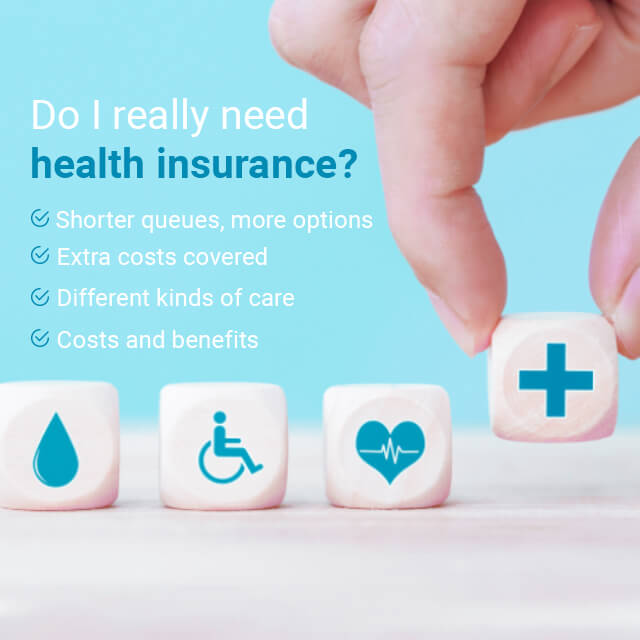Protecting your future self
In New Zealand, if you break your leg, have a baby or need life-saving surgery, you get the care you need without a huge bill at the end. We’re lucky – our healthcare system offers high-quality care and treatment to residents for free, or for a small charge.
Because our system is so good, many Kiwis think of private health insurance as an unnecessary luxury. They believe that they’ll always get the care they need through the public health system, so paying a premium for life insurance every month seems wasteful.
But the comparison isn’t that simple. Although our health system offers great care in most cases, it has its flaws. And as our population ages, the system may come under further strain, which could mean lower quality care or longer wait times.
If you’re young and healthy, private health insurance may not be a must-have now, but as you age it could save you time, money – and pain.
Shorter queues, more options
One of the chief downsides of the public health system is wait times for non-urgent care. There are simply not enough doctors in the public system to ensure that everyone gets treatment immediately. If you need to see a specialist or receive non-urgent treatment at a hospital or clinic, this means that you can wait four months or more. During that time, you could be in pain or discomfort – and you will likely be feeling worried about your potential results or the upcoming procedure.
If you have children, you can usually add them to your existing health insurance plan at minimal cost, so their elective or non-urgent procedures are covered as well. Common childhood treatments like inserting grommets and removing tonsils are not urgent, and the public wait time can be up to six months. Meanwhile, not getting them can cause ongoing pain and illness for your child. If you have private insurance, you can often get these procedures done shortly after referral.
That’s because health insurance lets you access care from private clinics and hospitals, which tend to have fewer patients and shorter wait-lists. You can often get an appointment with a specialist within one or two weeks. Private healthcare also offers more choice – rather than being assigned a doctor and appointment time, you can choose the clinic and pick a time that suits you.
Extra costs covered
Many health insurance plans offer cover for the minor costs incurred in the public health system. You may be able to claim payments for visits to your GP, eye and hearing tests, prescriptions, and other incidental costs – ultrasounds during pregnancy, for example.
Although government subsidies mean that one-off costs tend to be low, they can add up over the course of a year. Think about it: if a visit to the GP costs $50 and a couple visits five times a year each, that alone makes up $500 a year. And that’s before you get to prescriptions and other potential costs.
Different kinds of care
Healthcare doesn’t begin and end with doctors and hospitals – and health insurance recognises that. Many plans cover forms of treatment that can be beneficial but are not covered by the public system, such as acupuncture, massage, and physiotherapy.
You can also choose to buy insurance to cover dental care. Because dental care is generally costly and isn’t covered by the public system, premiums tend to be high. But you’ll be paying for your dental care out of your own pocket anyway, so in some cases, dental insurance is a better option.
Costs and benefits
The cost of health insurance is what puts many people off. If you’re young and healthy, it can be hard to imagine needing significant health care – so paying a premium for insurance every month seems like an unnecessary drain on your budget.
But you need to think about your future self as well. If you get health insurance when you’re young and healthy, your premiums will go up gradually over time – but you’ll always have coverage. If you wait until you’re older, premiums will be very steep – and any existing health issues you have may exclude you altogether. The health system may be more overloaded by then, and you could be facing longer wait times and limited care options. If you don’t need insurance now, think of it as an investment in your future health.
Investing in your future
Shorter wait times, more choice, cover as you age – we think the benefits of health insurance make it worth your while. If your workplace offers subsidised health insurance as a benefit, it’s a no-brainer. But if you’re looking for health cover as an individual, it’s a bit more complicated. Before you sign, you need to take a good look at your budget, your health needs, and any existing health issues.
That’s where Global Finance comes in – our insurance brokers know the health insurance business inside and out. We can help you work out whether health insurance is right for you, discuss any pre-existing conditions, and find a provider and a plan to suit your needs.
Want to protect your future health? Get in touch with the Global Finance team.
**Underwriting criteria and insurer terms T’s and C’s apply

